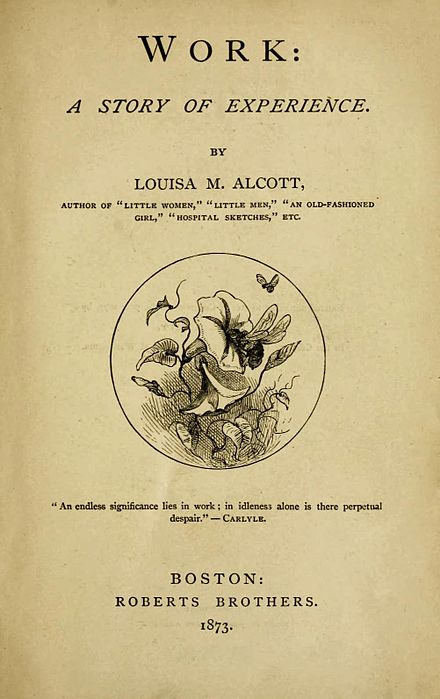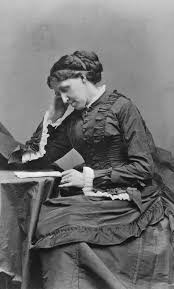|
Louisa May Alcott's novel, Work: a Story of Experience, is a defence of women's quest for independence through work that seems to owe much to Mary Wollstonecraft's philosophy. One running theme of the novel is that poor women can achieve emancipation through work. Much work doesn't allow them to do so because it is drudgery for abusive employers. But the book features a number of virtuous people who make it part of their life work to help create better employment situations for women in need, women who want to escape forced marriage (as is the case with 15 year old Kitty) or women who forfeited family ties by entering in a relationship outside marriage and are now shunned by society (such as Rachel) The heroine of the novel, Christie Devon, declares to her aunt in the first line of the book that there is going to be 'a new declaration of independence', and that she is going to leave home, try out various lines of work and hopefully end up with a career. She wants to see the world and earn a living, but mostly, she wants to be free ('I do love luxury but I love independence more', says she when turning down a rich suitor she does not love). She tries various professions: maid, governess, actress, companion, seamstress, and at one point she is without work and destitute and considers suicide, but is rescued by a woman who is part of circle of people who help working women. By the end of the story, Christie has found a career: she has become a speaker and activist on behalf of working women. The women she helps are poor, but she believes that there is room for improvement in the condition of rich women too, and when a rich acquaintance comes to ask her how she might help, she tells her as much: rich women 'need help quite as much as the paupers, though in a very different way'. The task she gives Bella is to set up a beautiful and elegant salon in her brother's home, and there set a new fashion, one for common sense. She adds: " I don't ask you to be a De Stael and have a brilliant salon: I only want you to provide employment and pleasure for others like yourself who are now dying of frivolity or ennui." What's distinctive about Alcott's proposal is that the salon is designed primarily for the improvement of women. Like a traditional salon, it is hosted by a woman, and welcomes men and women of good society. But unlike traditional salons which are mostly for facilitating the exchange of ideas, literary, political or otherwise among men, this one is designed to encourage women to think about things other than dress and parties, and to embrace more 'old-fashioned' and 'commonsensical' ideals. This, according to Alcott is the sort of help rich women need, and it sounds very much like Wollstonecraft's quest for a slowly achieved revolution in manners.
0 Comments
Leave a Reply. |
About
This is where I live blog about my new book project, an intellectual biography of three French Revolutionary women philosophers. Categories
All
Archives
November 2022
|


 RSS Feed
RSS Feed